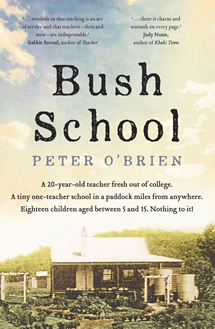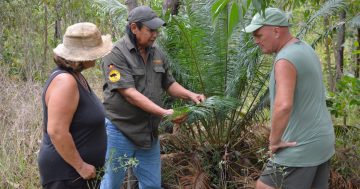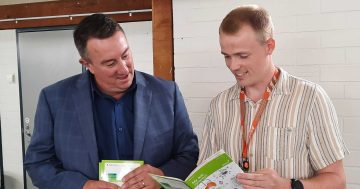Reviewed by Rama Gaind.
By Peter O’Brien, Allen & Unwin, $29.99.
 What a winning story this is of a time long-gone and the struggles of a young man with his first teaching assignment in a village at the back of beyond.
What a winning story this is of a time long-gone and the struggles of a young man with his first teaching assignment in a village at the back of beyond.
With barely more than a year of teaching, O’Brien was aged 20 years when in 1960 he fulfilled his rural teaching service requirement and selected a remote region in NSW on the western lip of the Great Divide. After an uncomfortable journey, with two days’ travel by train and mail car from Armidale, it was a worrying introduction to his lodgings.
There was a bed, a timber floor, thin tar paper on one side for privacy from the nearby road but nothing else. The flimsiest of ‘walls’, no pegs or nails to hang even a hat, no door, no rug for cold morning bare feet, no bookshelf for a voracious reader, no bedside cupboard for a lamp or a glass of water, no light source — just a bed and a suitcase for the next two years.
Even so, Peter found himself welcoming 18 students, ranging in age from five years to 15, at the one-room Weabonga School. With few lesson plans, scant teaching materials, a wide range of curious minds and ages to prepare for, Peter was daunted by the enormity of the task ahead. He had never before lived away from his home in Sydney.
He’d had some teaching experience, but nothing to prepare him for the monumental challenge of being solely responsible for the education of this group of students who were already at a disadvantage because of the town’s remoteness. Some wise words from his aunt held him in good stead on his first day after enrolments. “Bush children run and hide at the sight of strangers. Give them time and be gentle. You’ll do all right if you keep that in mind. Never rush them.”
He “detected nothing but unvarnished truth from the pupils yarning with me. I did find the openness that first day unexpected and very appealing”. Peter makes a meaningful contact through his memoir as he scrutinises his experience, and that of his students, in the midst of wider Australian community events and issues. Even his warm recollections of unknown people and places are significant.
Bush School tells movingly of the resilience and spirit of children, the importance of learning and the transformative power of teaching. The students were keen and receptive and had been blessed with a keen and dedicated teacher. It was the children and their thirst for learning who kept Peter afloat during the early days of appallingly scant living conditions, an inadequate diet and the awful loneliness he felt being cut off from family, friends and his budding romance.











